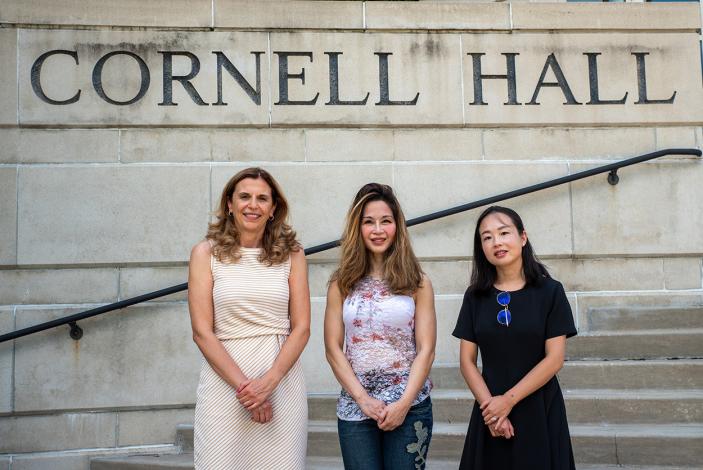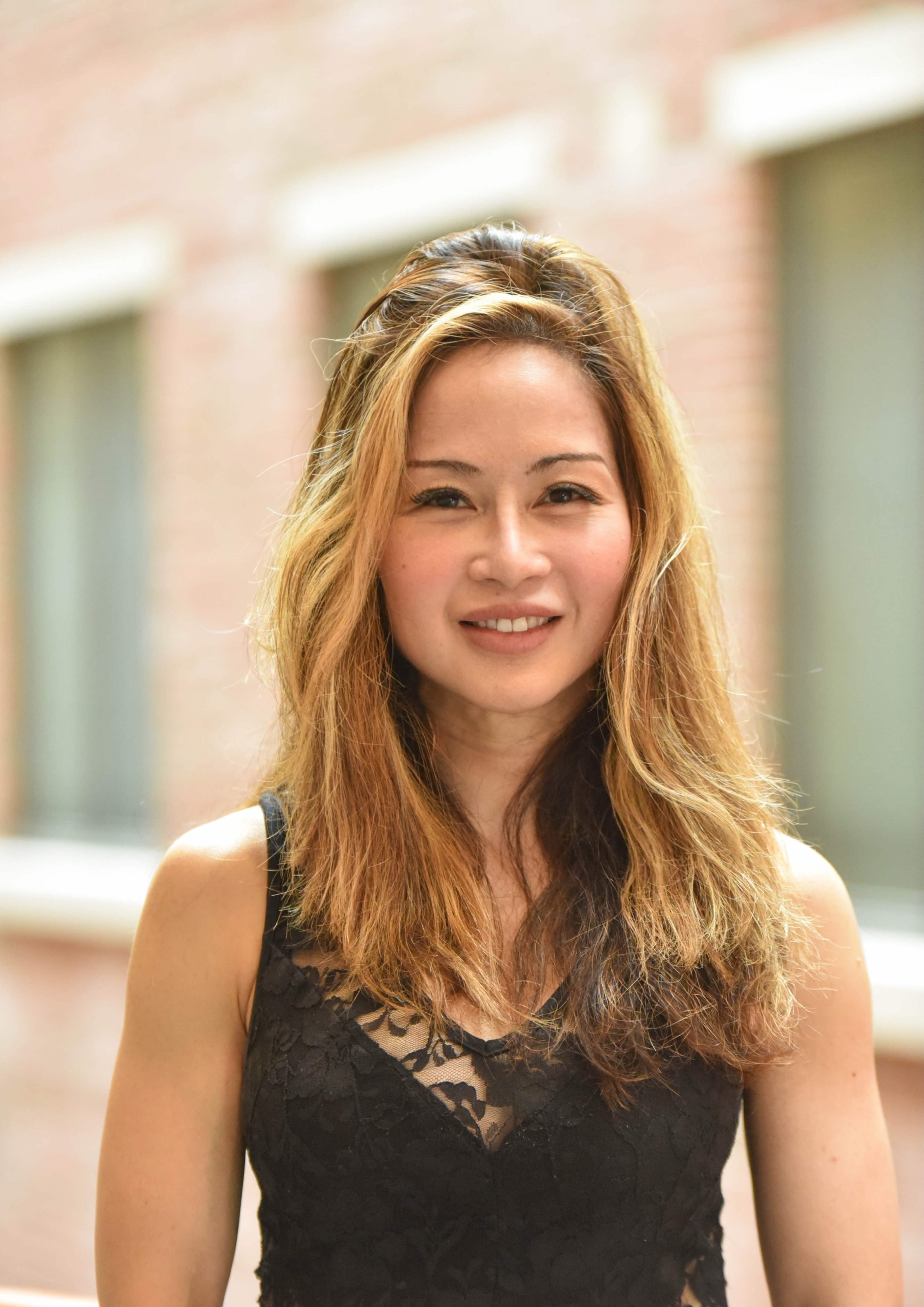
Pursuing quantum questions: Trulaske researchers investigate emerging technology’s potential

From Left to Right: Detelina Marinova, Kuntara Pukthuanthong, and Zhuping (Zoe) Li. Photo by Zac Anderson.
As quantum computers stand at the threshold of having the capability to solve problems and answer questions more quickly than even the world’s most powerful supercomputers, forward-thinking researchers at the University of Missouri’s Robert J. Trulaske, Sr. College of Business are leading the way in efforts to understand and harness the technology’s potential.
Kuntara Pukthuanthong-Le, Trulaske’s Marie M. and Harry L. Smith Endowed Chair Professor of Finance, is applying quantum computing to financial markets to address computational bottlenecks in learning, prediction and decision-making. Quantum computers use quantum bits, or qubits, to process and solve complex problems exponentially, creating the opportunity for financial agents to leverage the technology in order to develop and execute trading strategies much more quickly, and in today’s high-paced financial industry speed provides a competitive advantage.
“Quantum computing could fundamentally transform financial markets by enabling faster and more accurate processing of complex data,” Pukthuanthong said.
Pukthuanthong’s research will look at how quantum technology can be used by financial practitioners to access analysis in real time and examine whether its use could lead to more efficient financial markets and more timely price adjustments in the future.
“Quantum computing isn't just about faster calculations — it's about rethinking financial economics from the ground up,” Pukthuanthong said. “For hedge funds, a quantum-powered algorithm could analyze hundreds of risk factors in seconds — transforming how quickly trading strategies are developed or mispricings are corrected, potentially offering a speed advantage in highly competitive global markets. Our conjecture is that computational limits explain up to 20-30% of market inefficiencies, like persistent mispricing or contract failures, beyond traditional factors like irrationality.”
International Year of Quantum Science and Technology

The year 2025 has been declared the International Year of Quantum Science and Technology in recognition of the 100th anniversary of the initial development of quantum mechanics. Trulaske’s research is part of global efforts to understand the technology’s potential — and its limitations. While promising, quantum computing faces significant hurdles in financial applications, Pukthuanthong said, including data challenges, ethical risks, cybersecurity threats to trading platforms and a global shortage of experts in quantum finance.
Pukthuanthong cites the availability of specialized resources at Mizzou, like the State of Missouri’s first IBM Quantum Innovation Center, as providing a strong foundation to help quantum researchers understand these hurdles and find solutions. The center offers researchers and institutions access to advanced quantum computing through IBM’s cloud-based platform.
“I'm thrilled to be advancing quantum research at the University of Missouri, where resources like our Mizzou Quantum Innovation Center and Mizzou's College of Engineering enable real progress,” Pukthuanthong said.
Collaboration across campus is a critical asset in Pukthuanthong’s research, as well. Experts in computer science and data analytics are helping her to customize Quantum Neural Networks. Pukthuanthong is also partnering with Mizzou’s Physics and Engineering departments to develop hardware-aware models.
“This interdisciplinary approach accelerates my work and ensures it's grounded in both theory and feasible implementation,” she said.
Researchers in Trulaske’s Marketing Department hope to harness quantum’s capabilities to help public service providers optimize their communications on social media platforms. Samuel M. Walton Distinguished Professor of Marketing Detelina Marinova and Trulaske PhD student Zhuping (Zoe) Li are bridging classical and quantum computing methods to analyze the language used in social media posts by public service providers in the United States, Canada and United Kingdom to determine which attributes of published information are most effective at communicating with the public, and how those communications influence public sentiment.
The study is designed to help public service providers craft their social media posts to communicate more clearly and effectively with the customers they serve, leading to increased public trust and customer wellbeing. It will also offer public service providers a greater understanding of the spread of misinformation and how to mitigate it. The researchers hope it will help the public better understand social media communications from these providers, too.
Li sees the research as having broader implications, as well. A gap has often existed between advancements in computer science and their practical applications in marketing, she said. It’s a gap she plans to shrink by demonstrating how quantum computing can be used in her own marketing research.
Quantum research reflects Trulaske’s commitment to transformative technology
Li credits Trulaske for empowering her to pursue her research by creating an internship opportunity. She hopes to introduce others, including undergraduates, to this powerful technology.
Drew Reeves, director of Transformative Technology Initiatives at Trulaske, said that staying ahead of emerging technology trends like quantum computing enables Trulaske to prepare students for the realities of a rapidly evolving business environment.
 “These projects give the Trulaske community hands-on experience with emerging quantum technologies and their business applications. In turn, instructors guide students in developing the knowledge and skills to thrive in a landscape defined by data-driven decision-making, ambiguity and innovative problem-solving,” Reeves said. “As they graduate, this generation of students will lead the way in bringing transformative technologies like quantum into real-world business practice.”
“These projects give the Trulaske community hands-on experience with emerging quantum technologies and their business applications. In turn, instructors guide students in developing the knowledge and skills to thrive in a landscape defined by data-driven decision-making, ambiguity and innovative problem-solving,” Reeves said. “As they graduate, this generation of students will lead the way in bringing transformative technologies like quantum into real-world business practice.”
The quantum research projects reflect the College of Business’s ongoing commitment to providing leading-edge transformative technology opportunities to students and faculty.
“By exposing students to transformative technologies and their implications, the college ensures graduates are positioned to lead, innovate and create value in industries shaped by these advancements,” Reeves said. “True innovation anticipates the future from an analytic framework, creating answers for questions the world hasn’t even asked yet, positioning Trulaske as a leader in business education while fostering strong connections with industry partners navigating similar technological shifts.”
While students and faculty benefit from Trulaske’s transformative technology initiative, the college makes strategic use of these resources to benefit the business community, as well.
“Our quantum-powered research is just one example of Trulaske’s visionary use of research and technology to uncover insights that give businesses a competitive edge,” said Balaji Rajagopalan, dean of the Trulaske College of Business. “By pairing the innovative thinking of our top-notch researchers with the latest in leading-edge technology, the college is able to deliver actionable, practical insights that are timely and relevant.”
Mizzou’s Robert J. Trulaske, Sr. College of Business prepares students for success as global citizens, business leaders, scholars, innovators and entrepreneurs by providing access to transformative technologies, offering experience-centered learning opportunities and fostering an entrepreneurial mindset.